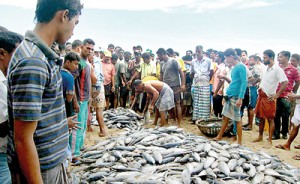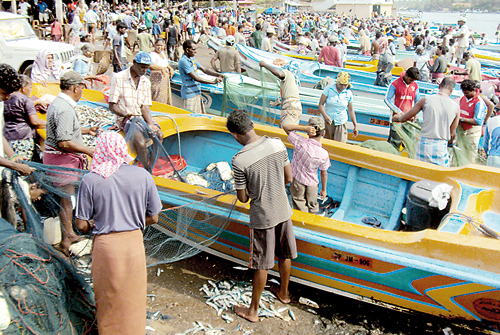News
East coast alive with dead fish
Hordes of fish being swept onto the eastern shores will be a daily sight for the next two to three weeks, till the inter-monsoonal period ends, according to oceanographers.
Last week, shoals of fish were found some dead, some alive, along the east coast, from Samanthurai to Lanka Patuna. They were predominantly sardines and skip jack tunas, with big fish like eel and mullet (gal maalu) also in significant quantities.

Dead fish washed ashore in the east coast. Pic by Washantha Chandrapala
Officers of the National Aquatic Resources Research and Development Agency (NARA) said a similar scenario was experienced in the mid 90s and in 2006.
“The abundance of fish during the second inter-monsoon between October and end-November, is a common phenomena along the eastern coastal areas of Sri Lanka,” NARA Oceanography Chief, K. Arulananthan said.
This is because, during the second inter-monsoon, the cold-waterfront which normally lies offshore gradually comes ashore, while the salinity of the Bay of Bengal, along with its temperature, becomes comparatively low, he explained.
The low temperature, low salinity assisted by the passage of the cold-waterfront, create ideal conditions for Algal Bloom, a rapid accumulation of the Algae plant. This plant is involved in photo synthesis for food. The abundance of algae means food for small (pelagic) fish. When the temperature and salinity best suit the fish, normally found offshore, come closer to shore to feed. When swimming towards the shore, these small fish get swept ashore by the waves. Even big fish too, that come to feed on the small fish, get swept ashore by the waves.
“This is a common phenomena during the inter monsoon period and we should be prepared to harvest the fish, which is in abundance. We should look upon it as an opportunity, not a disaster,” he said.
“Since planktons (algae) are produced in large concentrations, even the sea turns dark in colour,” Dr Arulananthan added.
The oceanographer from NARA also explained the large amount of planktons (algaes) means they absorb a large amount of oxygen from sea water at night, reducing the oxygen found in the water column.
These planktons drop to the ocean floor to decay, for which they require more oxygen. As a result fish found near the ocean floor, referred to as demersal fish, die because of the depleted level of oxygen. But the small fish will still survive, as they stay in the cold water. Once the small fish also get to the wave-breaking zone, they too will die in a few minutes on being washed ashore, he explained.
“This has nothing to do with the tsunami. There is a misconception among the public of an impending seismic activity signalled by this abnormal phenomenon. The absence of deep-sea fish, clearly indicates that this trend does not relate to any impending disasters,” Dr. Arulananthan said.
Commenting on tests carried out on the fish, Dr. Arulananthan said the results clearly indicate that the fish were not contaminated with poisonous substance or any foreign particles. Therefore the fish have died due to oxygen deficiency and not due to any contamination.
However, he emphasised the urgency in harvesting the fish immediately, as they could rot easily due to infectious bacteria, affecting other fish too.
Environmentalists too have urged authorities to speedily dispose of the dead fish before it becomes an environmental hazard.
Environmentalist Jagath Gunarwardena commenting on this added, “the authorities should organise a proper beach cleaning and sanitation programme. If not the rotting fish will contaminate the sea water and the other fish. The best way to dispose of the rotting fish is to bury or burn them,” he added.
Meanwhile those involved in the fishing trade complain that they are facing problems because people outside the trade have also started selling the fish found in abundance.All Ceylon Fisher Folk Trade Union General Secretary, Dinesh Suranjan said, coastal area residents are selling the fish at a low price undercutting their trade.
“People can preserve the excess fish without selling all the fish at once in the market. This is an alternate way to avoid undue competition, and the government should intervene by introducing price control,” he added.
Follow @timesonlinelk
comments powered by Disqus


























